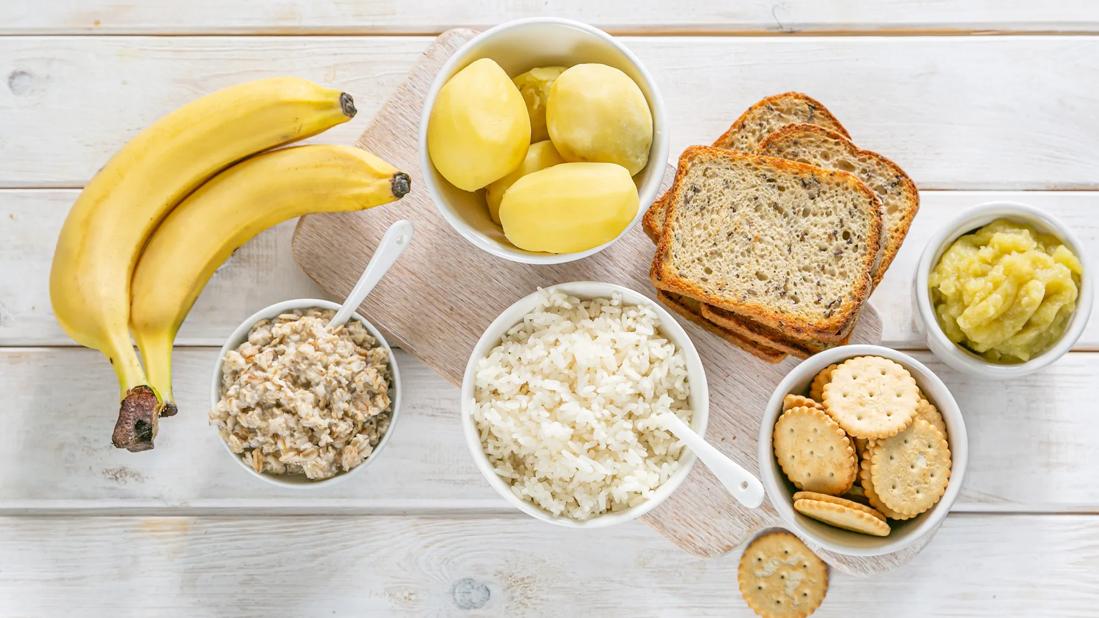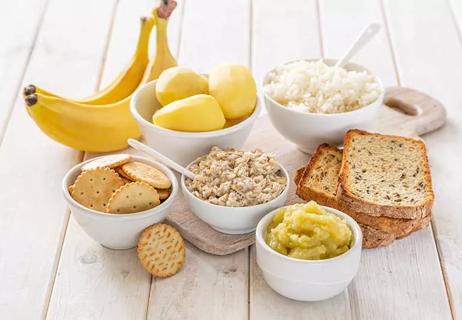Bananas, rice, applesauce and toast are easy on your stomach, but they don’t have enough vitamins and nutrients for more than a couple days

When you’re in the thick of the stomach flu, you need foods that won’t make things worse. You’ve probably heard that the so-called BRAT diet can ease symptoms like nausea, diarrhea and vomiting.
Advertisement
Cleveland Clinic is a non-profit academic medical center. Advertising on our site helps support our mission. We do not endorse non-Cleveland Clinic products or services. Policy
But this temporary diet, which was once considered the go-to for an upset stomach, lacks essential nutrients and is no longer recommended. Family medicine specialist Sarah Pickering Beers, MD, explains.
BRAT is an acronym that stands for:
All four of these foods are soft, bland and low in fiber, which may help settle your stomach for a day or two when you’re dealing with gastrointestinal issues like:
“Those foods tend to be pretty gentle on the GI tract,” says Dr. Pickering Beers, “but they really won’t improve your nausea. It’s just a way to get some nutrients into your system when you’re having trouble keeping anything down.”
BRAT is a handy way to help you remember a few of the foods you can turn to when you’re sick. But bananas, rice, applesauce and toast aren’t the only foods that can help when you’re dealing with an upset stomach.
“You don’t necessarily need to stick to those four foods,” Dr. Pickering Beers clarifies. “Other soft, bland foods can be helpful, too.”
When you have diarrhea and vomiting, other mild foods may also be gentle on your stomach, like:
Advertisement
When your stomach is starting to feel evened out a bit, you can start adding in foods that are still soft and bland but a bit more nutritious, like:
Just be sure to take it slowly.
“Typically, people are encouraged to eat as tolerated,” Dr. Pickering Beers says. “Your stomach tends to handle smaller meals better.”
While you’re sick, it’s smart to avoid foods that could make you more dehydrated, contribute to your nausea or cause you to vomit more. When you’re at your sickest, steer clear of:
The hope of the BRAT diet is that these bland foods will be easy enough on your stomach that you’ll be able to tolerate them when sick. But when you’re in the throes of a stomach illness, you may not be able to eat anything at all for a few hours.
“If you’re actively vomiting, then you need to stick to liquids,” Dr. Pickering Beers advises. Plus, when you have vomiting and diarrhea, it’s extra important to make sure you’re replacing lost fluids. Liquids to drink include:
“If you’re vomiting or having diarrhea for more than a day or two and aren’t feeling any better, it’s time to contact a healthcare provider for medical advice,” Dr. Pickering Beers stresses.
For adults, the BRAT diet is OK for a day or two when you’re at your sickest. But you shouldn’t follow it for longer than that because it lacks vital nutrients like:
“In the short term, when you’re sick, the BRAT diet can be a means to an end,” Dr. Pickering Beers acknowledges. “But you’re not getting any great nutritional value from it, and you’re not going to get everything that you need if you use it long term.”
What about children? Following a strict BRAT diet is no longer recommended for kids with diarrhea, as the American Academy of Pediatrics says it’s too restrictive and doesn’t have enough nutrients to help your child’s gastrointestinal tract recover. In fact, following the BRAT diet for more than 24 hours may even slow down your child’s recovery.
Ultimately, BRAT is just a handy acronym for remembering the types of foods that are gentle on an upset stomach. During or after an acute stomach illness, you can eat other soft, bland foods, too — and as soon as you’re feeling well enough to eat more, you should. Your body needs the nutrients to help you get back to full strength.
Advertisement

Sign up for our Health Essentials emails for expert guidance on nutrition, fitness, sleep, skin care and more.
Learn more about our editorial process.
Advertisement

Stomach bugs, foods and excess bile or fats can cause yellow diarrhea

Yes, diarrhea is common after drinking too much alcohol — and the best treatment is to hydrate and wait it out

Keep the menu plain and simple and make sure you stay hydrated

Keto can reduce blood sugar, but that doesn’t mean it’s right for everyone

Gallstones can block bile in your biliary system and lead to pain and discomfort

People with PKU need to avoid high-protein foods, like meat, dairy, legumes and whole grains

The caffeine and natural acids in coffee may trigger acid reflux, but there are ways to lessen the effects

Olive oil is high in heart-friendly unsaturated fats

Even small moments of time outdoors can help reduce stress, boost mood and restore a sense of calm

A correct prescription helps your eyes see clearly — but as natural changes occur, you may need stronger or different eyeglasses

Both are medical emergencies, but they are very distinct events with different causes